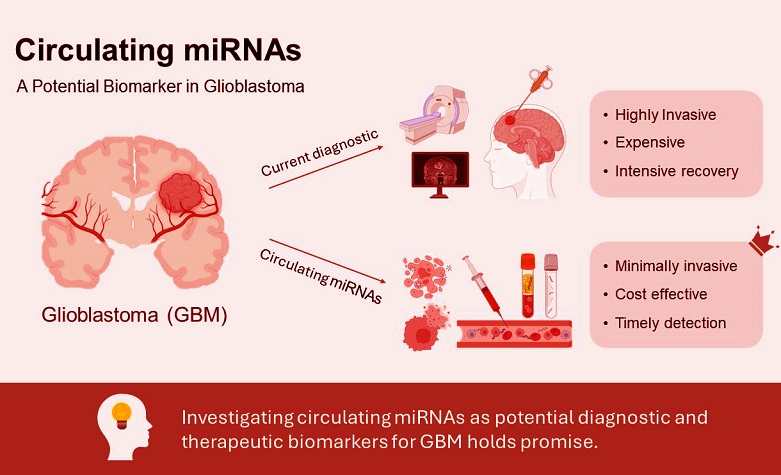Unlocking the Potential of Liquid Biopsies in Glioblastoma Diagnosis and Treatment
Nikhil Prasad Fact checked by:Thailand Medical News Team Nov 17, 2024 4 months, 3 weeks, 5 days, 9 hours, 31 minutes ago
Medical News: Glioblastoma (GBM) is the most aggressive and common type of primary malignant brain tumor in adults. With a survival rate of less than 7% at five years and an annual incidence of 3.26 cases per 100,000 people, GBM presents a significant challenge to patients and medical professionals alike. Current diagnostic methods, including MRIs and biopsies, come with limitations such as poor differentiation of tumor types, the invasive nature of biopsies, and high associated costs. This
Medical News report explores groundbreaking research into liquid biopsies as a promising alternative.
 Graphical Abstract - Unlocking the Potential of Liquid Biopsies in Glioblastoma Diagnosis and Treatment
Graphical Abstract - Unlocking the Potential of Liquid Biopsies in Glioblastoma Diagnosis and Treatment
The study, led by researchers from the Johns Hopkins University School of Medicine, delves into the potential of microRNAs (miRNAs) found in cerebrospinal fluid (CSF) and blood as non-invasive biomarkers for diagnosing and monitoring GBM.
The Role of Liquid Biopsies and miRNAs
Liquid biopsies are emerging as a less invasive option compared to traditional brain tissue biopsies. They detect biomarkers such as circulating tumor DNA (ctDNA), miRNAs, and extracellular vesicles (EVs) in the blood and CSF. Among these, miRNAs - tiny RNA molecules that regulate gene expression - show immense promise. Found in blood, urine, and CSF, miRNAs can indicate the presence of GBM, offering valuable insights into tumor behavior and treatment response.
MiRNAs are classified as either tumor suppressors or oncogenic drivers, depending on their role in GBM progression. For example, miR-181 and miR-34a act as suppressors by limiting cell proliferation and inducing apoptosis, while miR-21 and miR-93 promote tumor growth and resistance to therapy.
Advantages of Liquid Biopsies in GBM
-Early Detection and Monitoring
Liquid biopsies enable the early detection of GBM by identifying specific miRNA profiles. For instance, miR-21 and miR-146a levels in blood and CSF have shown significant differences between GBM patients and healthy controls.
-Minimized Risk and Cost
Unlike invasive surgical biopsies, liquid biopsies reduce the risk of complications and hospital stays, making them more patient-friendly and cost-effective.
-Insights into Tumor Behavior
MiRNA panels can reveal the tumor's aggressiveness and response to treatments, paving the way for personalized therapeutic strategies.
-Potential for Treatment Monitoring
Changes in miRNA levels during treatment could provide real-time feedback on the efficacy of therapies like chemotherapy or radiotherapy.
Challenges in Using miRNAs for GBM
Despite their potential, several obstacles remain. The blood-brain barrier (BBB) limits the release of miRNAs into the bloodstream, complicating their detection. Advan
ces like MRI-guided focused ultrasound to temporarily open the BBB are being explored to address this issue. Moreover, the lack of standardized methods for isolating and analyzing miRNAs hinders their clinical application.
Research also highlights the need for larger studies to validate miRNA-based diagnostics. miRNAs such as miR-21 are not exclusive to GBM, appearing in other cancers like breast and colorectal, which could lead to diagnostic inaccuracies. Panels combining multiple miRNAs may enhance specificity and sensitivity.
Promising Findings and Future Directions
The researchers emphasize the role of miRNA in both diagnostics and therapy. For example, studies have demonstrated that restoring the levels of tumor-suppressive miRNAs like miR-34a could suppress tumor growth, while inhibiting oncogenic miRNAs such as miR-21 could improve treatment outcomes.
Exosomal miRNAs, which are protected from degradation and can cross the BBB more efficiently, represent another avenue for investigation. Early trials suggest that exosomal miRNA profiles could distinguish GBM patients from healthy individuals with high accuracy.
Conclusion
The study offers a glimpse into the future of GBM management, where non-invasive liquid biopsies could revolutionize early detection, diagnosis, and treatment monitoring. However, challenges such as standardization, specificity, and effective miRNA delivery systems must be addressed. Collaborative efforts in technology, clinical trials, and bioinformatics are crucial to unlocking the full potential of miRNA-based diagnostics and therapeutics.
The study findings were published in the peer-reviewed journal: Life.
https://www.mdpi.com/2075-1729/14/10/1312
For the latest on Cancer Diagnostics, keep on logging to Thailand
Medical News.
Read Also:
https://www.thailandmedical.news/news/amino-acid-deprivation-as-a-new-hope-in-glioblastoma-treatment
https://www.thailandmedical.news/news/glioblastoma-may-weaken-key-immune-cells
https://www.thailandmedical.news/news/napabucasin-shows-promise-for-glioblastoma
https://www.thailandmedical.news/news/natural-compounds-show-promise-as-adjuvants-for-glioblastoma
https://www.thailandmedical.news/news/new-hope-for-glioblastoma-treatment-orladeyo-shows-promise-in-reducing-cerebral-edema
https://www.thailandmedical.news/news/university-of-mississippi-study-shows-that-juice-of-the-cornelian-cherry-can-help-with-glioblastoma
